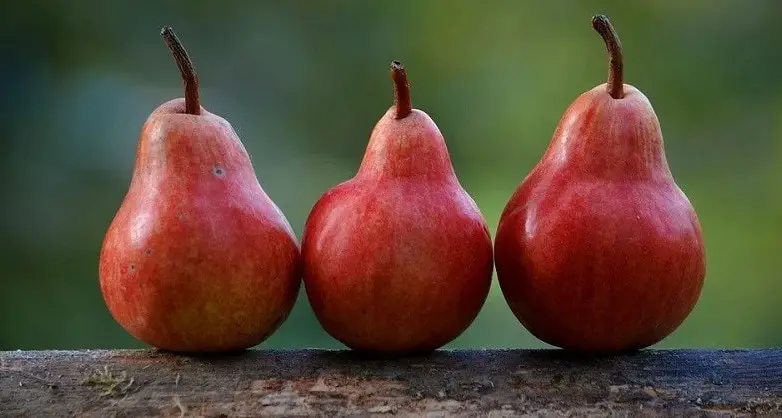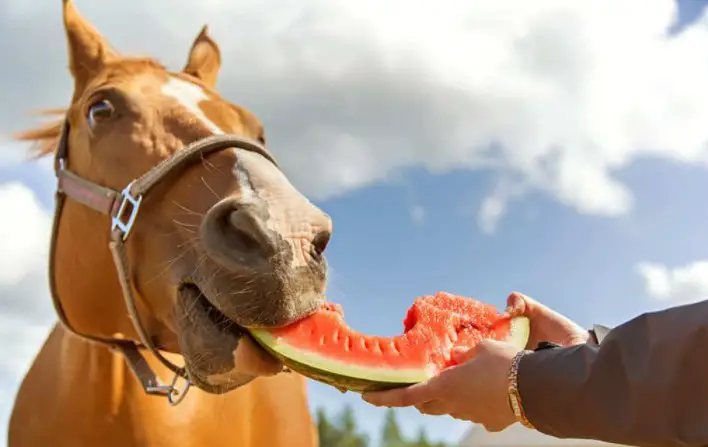Just like any other animal, owning a horse requires proper care and attention. One of the crucial aspects of horses’ well-being is their nutrition, so paying attention to their nutrients is essential.
Horses simply graze on grass, seed, or shrubs in the wild. As such, most owners feed their horses a diet primarily of grass or hay. However, some people choose to include other foods at feeding time, which is perfectly acceptable. Horses can benefit from the introduction of extra nutrients in their diet, which they can get from fruits and vegetables. One of the fruits commonly fed to horses is pears.
Both veterinarians and equine nutritionists conclude that pears are safe to feed your horse, and they are an excellent snack between meals. As such, we’ve developed this helpful guide that covers all the essential information you need to know about feeding pears to your horse.
How to Feed Pears to Your Horse
Not only are pears delicious, but they are also rich in fiber and antioxidants. In fact, pears offer a load of health benefits. However, horses should only consume about one to two pounds of pears per day, and you need to be careful that your horse doesn’t accidentally ingest too many pear seeds.
To prepare pears for your horse, start by washing them. Then remove both the stem and the seeds. Next, cut the fruit in small chunks and feed these to your horse one by one. Pieces of pear can pose a choking hazard for horses with a tendency to gulp their food.
Alternatively, you can cut the pears up and cook them to make them easier to eat. In contrast to raw pears, these can be softer and mushier, making them easier to swallow. Plus, they’re an excellent option for horses with teeth issues. Allow the pears to cool before feeding them to your horse; they should be served completely cold.
Pear Seeds and Cyanide Poisoning
The reason you want to be careful that your horse doesn’t eat pear seeds is that they contain an ingredient called amygdalin. The chemical compound is there to protect the fruit. However, when amygdalin is crushed and ingested, it turns into hydrogen cyanide. Apples, peaches, and apricots all have seeds that contain this chemical.
Hydrogen cyanide is highly toxic when inside the body as it robs your cells of oxygen. Ingesting hydrogen cyanide in a high concentration is lethal to humans and animals. Note that around 0.2-1.6 mg of cyanide per pound of body weight can cause cyanide poisoning. For reference, one gram of apple seeds is estimated to consist of 1-4 mg of amygdalin, resulting in around 0.06-0.24 mg of cyanide in the body. The best way to prevent any cyanide poisoning is to chop the pears and remove the seeds you find in there before feeding your horse.
The Health Benefits of Pears for Horses
Now that you’ve learned how to feed pears to your horse let’s see what health benefits your horse may reap from eating it.

Rich in Fiber
Fiber is an essential part of any diet. Not only does it regulate bowel movements and prevent constipation, but it also feeds healthy gut bacteria. As a result, your horse could have improved immunity and may seem to age gracefully.
Pears are also rich in another form of soluble fiber called pectin. It is also known as a polysaccharide, which means indigestible sugars. It reduces cholesterol and blood fat by navigating and binding with cholesterol in the digestive tract, thus reducing the risk of heart disease in horses. In addition, it reduces the risk of stomach ulcers by forming a protective layer over the stomach lining. Finally, it may also help to prevent your horse from becoming overweight.
Rich in Vitamins and Minerals
Pears are also rich in vitamin C, E, and B6. Each of these benefits the health of horses in many different ways.
Vitamin E, for instance, maintains the neuromuscular functions of horses. In addition, vitamin C is an antioxidant that protects the cells from free radicals. Vitamin B6 regulates metabolism and controls your horse’s blood sugar levels.
Source of Hydration
Pears are among the fruits with high water content, like watermelons, and contain over 80% water, so they are perfect as a refreshing and hydrating snack for your horse.
Anti-Inflammatory
As pears contain vitamin C, they can help fight inflammation. Vitamin C is a powerful antioxidant that plays a vital role in a horse’s overall health. Constant inflammation may lead to many diseases and illnesses, so pears are a potential effective booster for the horse’s immunity.
Does This Mean All Fruits Are Safe for Your Horse?
No. Like apples and pears, other fruits and vegetables contain poisonous seeds or might be downright toxic.
Before giving food to your horse, you must know these to prevent causing any major digestive issues. For example, you should never give your horse any fruit or vegetable from the nightshade family of plants. Nightshade plants consist of many foods, such as tomatoes, potatoes, aubergines, peppers, and various other plants in this category. These are toxic to horses because they contain small amounts of alkaloids. The one in nightshade is known as solanine. This alkaloid acts as an insecticide in the plant’s growth stages and can cause nausea or diarrhea when ingested.

Other foods to avoid giving to your horse are dairy products, cauliflower, bread, cabbage, avocado, as well as any foods you are suspicious of. Overall, it is better to avoid feeding your horse anything you are not entirely informed about. Horses are pretty low-maintenance when it comes to food and can graze on grass and hay all day long!
Conclusion
Your horse might enjoy pears as a tasty treat and could even gain some health benefits from all the nutrients they offer. However, they should eat pears in a limited quantity minus the seeds that can lead to potential poisoning. The best thing you can do as an owner of a horse is to ensure your horse is adequately fed and given sufficient water to stay hydrated. Horses are energetic creatures and love to play with their human companions. Choose their snacks wisely to keep your horse healthy and happy.
